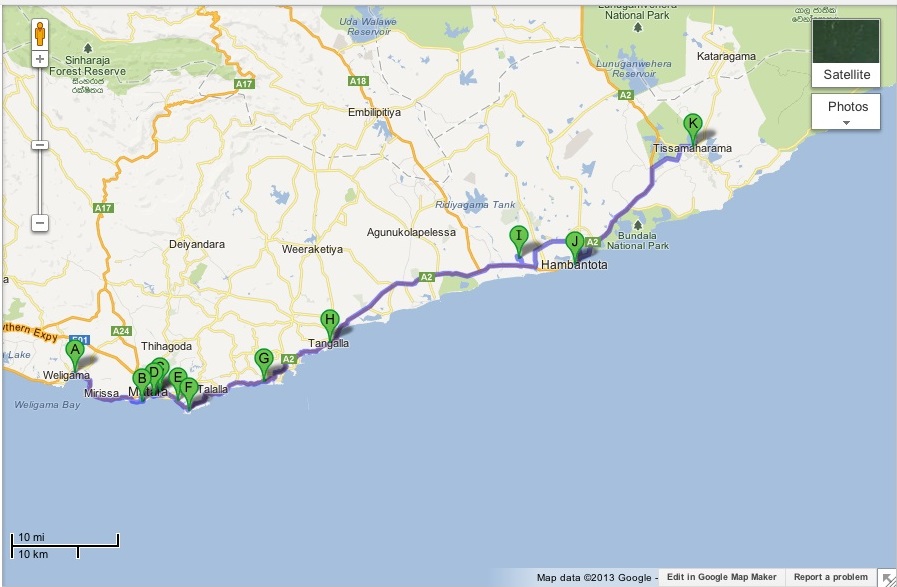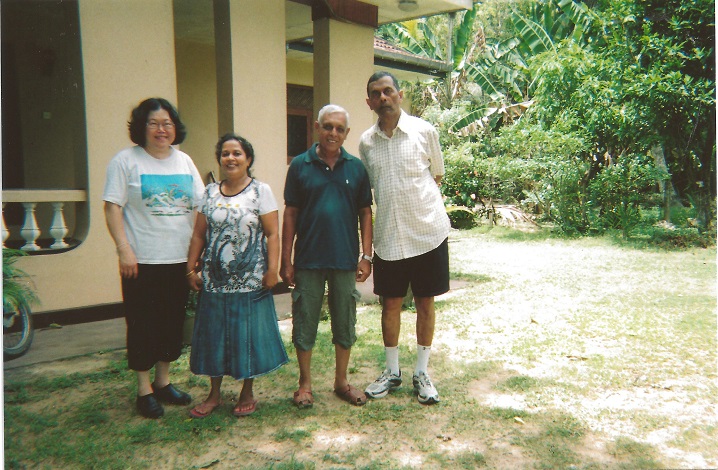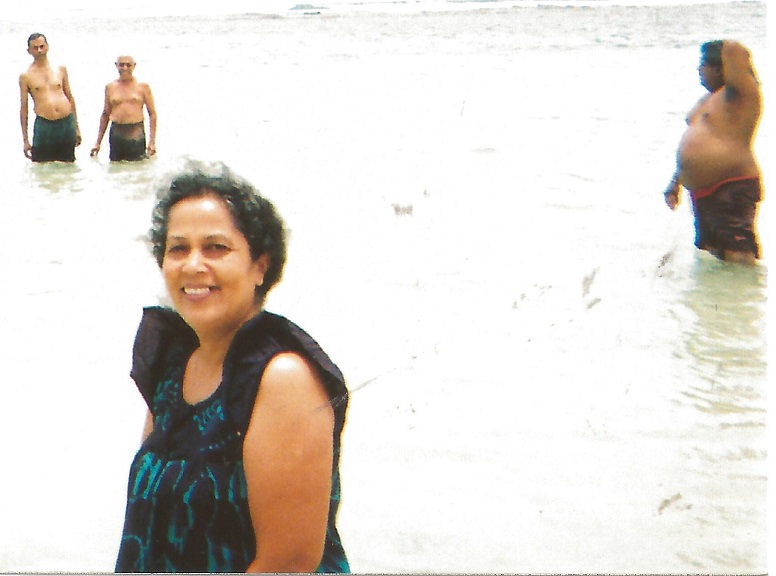Travels of a journalist [2013 Series #5] Matara brings memories of good old ‘50s; Cousin shows us Southern hospitality
Posted on June 16th, 2013
By Shelton Gunaratne, author of Village Life in the Forties: Memories of a Lankan Expatriate (Bloomington, IN: iUniverse)
Once upon a time, during my transition from Ananda College to University of Ceylon, I traveled daily by bus from Weligama to Matara to teach at a private academy called Nilwala Vidyalaya on the south bank of the Nilwala River. An uncle of mine, Atapattu Maama, the spouse of my fatherƒÆ’‚¢ƒ¢-¡‚¬ƒ¢-¾‚¢s youngest sister, was the man responsible for finding this job for me. The principal of the academy, Mr. Jayasinghe, a friend of my uncle, paid me some Rs. 100 a month for my intellectual labor.
Atapattu Maama, a longtime teacher at Rahula College, was a well-to-do but haughty individual who settled down in Issadeen Town, Matara. He procreated some seven children, mostly girls, most of whom eventually left Matara to live overseas. Only one of them, Mangalika, chose to live in Matara during her breaks from her job as an ILO employee in Geneva.
The writerƒÆ’‚¢ƒ¢-¡‚¬ƒ¢-¾‚¢s route in the Southern Province: From Weligama Bay to Tissamaharama
Nostalgia of my past connections with Matara in the late ƒÆ’‚¢ƒ¢-¡‚¬ƒ”¹…”50s entered my mind as we drove on the 16 km stretch of the coastal road from Weligama Bay to Matara Tuesday (April 2) morning. I thought of the pretty lass in school uniform who caught my attention as a youth. Often, she traveled in the same bus as I did between Mirissa Post Office and her school in Matara. But I never had the courage to speak to her!
During my mid-day break at the academy, I used to cross the bridge to Uyanwatte and walk north to the home of Uyanwatte Nenda (aunt) on New Lane to eat my lunchƒÆ’‚¢ƒ¢-¡‚¬ƒ¢¢”š¬‚always a sumptuous meal. Her brother, Edie Maama (uncle), also lived there. His older brother, who suffered from a neurological disability, ran a bakery on the opposite side of the road. The bakery uncle was the father of two kidsƒÆ’‚¢ƒ¢-¡‚¬ƒ¢¢”š¬‚Douglas and Darshanee. I knew that the two families did not get along too well.
When our driver Amal stopped the car at a coffee shop in Matara (pop. 68,244) for our breakfast, I suggested that we explore the New Lane area to look for Douglas even though our folks in Pathegama had told us that he no longer lived there. A white-skinned woman at a grocery store on New Lane told us that Douglas Gunasekera, the electrical engineer, lived not too far and gave us directions to get there.
At the New Lane home of Douglas and Kumari Gunasekera: The writer (right) and his spouse (left) with their hosts.
We went to his house and knocked on the door a few times, but no one responded. As we were about to give up hope, a sleepy white-haired man opened the door with some annoyance.
ƒÆ’‚¢ƒ¢-¡‚¬ƒ…-I am your cousin Shelton from America. Sorry if we disturbed your sleep,ƒÆ’‚¢ƒ¢-¡‚¬ƒ”š‚ I told him while also introducing my wife.
Douglas brightened his eyes and looked at us with great curiosity. He brought a couple chairs to the portico for us to sit on. He clarified that he decided to return to his ancestral property a couple years ago after his official retirement. But he was still working as a private consultant. Then, his wife, Kumari, also appeared in the portico to greet us.
Soon, Douglas disappeared in his car to bring a few knick-knacks for us to munch.
Over mid-morning tea, Douglas said that we should not worry about visiting Issadeen Town because our cousin Mangalika Atapattu had already left for Geneva.
Moreover, his sister Darshanee, who married Asoka Ruberu, now lived in Gampaha. Only the daughter of Edie Maama lived in the opposite house where I used to eat the meals served by Uyanwatte Nenda in the late ƒÆ’‚¢ƒ¢-¡‚¬ƒ”¹…”50s.
Because the day was getting hotter and we started sweating, Douglas and Kumari decided to drive us to the Polhena Beach, about 5 km to the southwest, for a dip in the Indian Ocean. We readily agreed. Very popular among the locals, Polhena is famous for its coral reef reachable by foot. A neurological fault made it difficult for me to walk even on the shallow waters of the salty sea.ƒÆ’-¡ƒ”š‚ So, Douglas held on to me all the way to the reef as I struggled with the waves.
At the Polhena Beach in Matara: Writer and Douglas (in the background) returning from the coral reef. Kumari (front)ƒÆ’-¡ƒ”š‚ also in the photo.
We used the public changing rooms to clean ourselves. We paid less than a dime for using this facility. I was pleased that the municipality did not ƒÆ’‚¢ƒ¢-¡‚¬ƒ…-fleeceƒÆ’‚¢ƒ¢-¡‚¬ƒ”š‚ me as an alien.
Then, Douglas offered us lunch at a nearby beach restaurant. We chose to eat Chinese-style fried rice.
We returned to DouglasƒÆ’‚¢ƒ¢-¡‚¬ƒ¢-¾‚¢ home, where Kumari offered us a variety of disserts, including papaya, watermelon, and ice cream. ƒÆ’-¡ƒ”š‚ Time raced against unstopped conversation when a sudden downpour alerted us to resume our eastward journey to TissamaharamaƒÆ’‚¢ƒ¢-¡‚¬ƒ¢¢”š¬‚118 km away. Willy-nilly, we had to stop our jabber and thank our hosts for the unusual welcome they gave us despite the fact that we barged into their ƒÆ’‚¢ƒ¢-¡‚¬ƒ…-home sweet homeƒÆ’‚¢ƒ¢-¡‚¬ƒ”š‚ without any notice.
In the rush to resume our journey, we forgot to stop at the home of Edie MaamaƒÆ’‚¢ƒ¢-¡‚¬ƒ¢-¾‚¢s daughter and family across the road to say goodbye.
We also skipped the Matara Fort, the location of the districtƒÆ’‚¢ƒ¢-¡‚¬ƒ¢-¾‚¢s law courts, where my grandfather and my mother spent a lot of time trying to settle our land disputes. This fort was another of the several built around the country by the Portuguese in the 16th century and renovated by the Dutch in the next century. The British turned the forts into administrative offices.
As well, we had to skip the Weherahena Temple, renowned for its Buddha statue, a few miles to the north of the coastal highway.
Less than four kilometers from the city, we stopped at the University of Ruhuna campus. The guard at the gate refused to let us enter the campus without prior permission. ƒÆ’-¡ƒ”š‚ When we identified ourselves and explained our circumstances, he agreed to call the administration, which agreed to allow us in with the guard as our guide. We enjoyed seeing the impressively scenic campus on the hills.
Back on the coastal highway, we passed the famous lighthouse at Dondra Point. The Dondra Temple brought memories of my childhood days when my mother brought us ƒÆ’‚¢ƒ¢-¡‚¬ƒ¢¢”š¬…”my older sister and meƒÆ’‚¢ƒ¢-¡‚¬ƒ¢¢”š¬‚there to attend religious festivals.
As we reached Dickwella, I thought of Kumaratunga Munidasa (1887-1944), the literary colossus and grammarian who sought to cleanse the Sinhala language of Sanskrit pollution, and took steps to do so with the help of like-minded literary figures by forming the Hela Havula (group). I was a 4-year-old kid when Munidasa died. But his influence on me was such that I converted my name to Shelutan Gunaruwan, when I attended Ananda College in the mid ƒÆ’‚¢ƒ¢-¡‚¬ƒ”¹…”50s. Munidasa was born in the village of Idigassaara.
Passing through Tangalle reminded me of the delightful days I spent with Punchi Amma, who was a nurse in the hospital, as I have described in my village sketches (Chapter 3 in Village Life in the Forties).
I craned my neck to get a good look at the statue of the renowned poetess Gajaman Nona (1746-1815), at the Nonagama Junction in Ambalantota. Although she was born in Colpetty, she settled down in the South when she found herself down and out. She was a genius in creating poetry spontaneously on the go.
My hopes to see the new Hambantota/ Mattala International Airport were dashed when I learned that it was located an extra 35 km north of the Hambantota Harbor, which itself was closed because of ongoing construction. Therefore, we by-passed the Hambantota town altogether and arrived in Tissamaharama well after nightfall.
Amal took us to an almost empty Sinhala restaurant, which bragged about serving authentic rice and curry. During the wait for food, we received a call from Douglas to inquire about our journey.
The cook and waitress at the restaurant was an attractive young woman who could pass muster as a movie star. She said she saw me on television news the previous night when I gave a talk at my book-launching event on the Kelaniya University campus.
As we were eating dinner, a Polish couple dropped in to seek our help to select food from the menu. We readily agreed as we were thoroughly enjoying the food.
ƒÆ’‚¢ƒ¢-¡‚¬ƒ…-You have the looks of a South Indian film star,ƒÆ’‚¢ƒ¢-¡‚¬ƒ”š‚ I complimented the server as we got up to leave the restaurant for our hotel.ƒÆ’-¡ƒ”š‚ She blushed.
[Next: Saga of Bandarawela Bappa]


